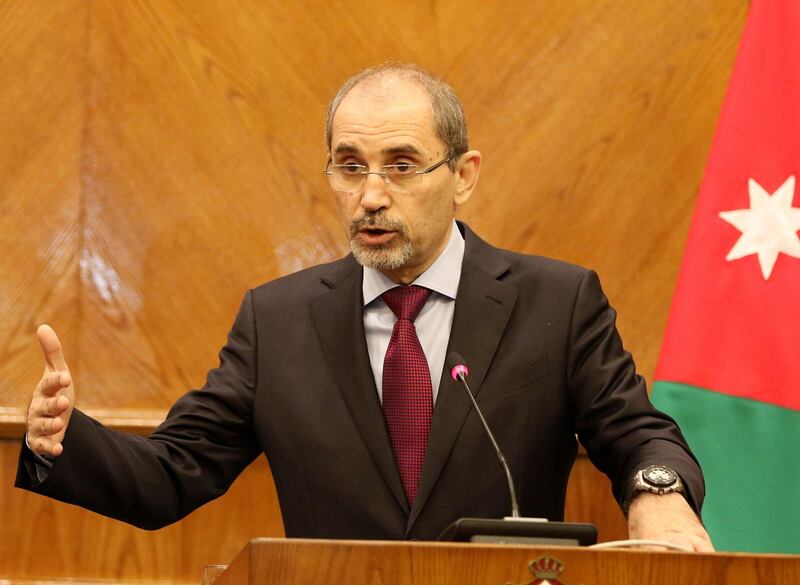Jordan will reopen its border with Syria only when it is ready, Foreign Minister Ayman Safadi said, in a signal that Amman could delay a decision that would boost President Bashar Al Assad.
Billions of dollars in annual trade with Europe and the Gulf moved through the Syrian-Jordanian Nassib crossing until the Syrian civil war broke out in 2011. It was captured by rebels in 2015 and its closure hurt the economy of Syria and neighbouring states.
Damascus said this week the road was ready for use but Mr Safadi said he had received no request to reopen it.
"We will deal with the request with all positiveness that serves our interests," he told a news conference with visiting French Foreign Minster Jean-Yves Le Drian on Thursday. "Matters have to stabilise."
Mr Safadi said he discussed reopening the crossing with Moscow. The crossing's recapture by Syrian forces was a central goal of a campaign launched last June by the government and Russian forces to regain control of rebel-held parts of the south-west.
Russia is a crucial backer of Mr Al Assad and Russian bombing was central to a campaign that forced the mainstream Free Syrian Army (FSA) rebels once backed by Jordan and Mr Al Assad's Western and Arab foes to surrender.
"Jordan in principle wants open borders with all its neighbours. But when and how, this will depend on when we ensure our interests and our security," Mr Safadi said.
Jordan is a US ally but Moscow wanted Amman to persuade rebels before it was retaken by government forces last month to cede control of the crossing to consolidate an accord between US President Donald Trump and Russian President Vladimir Putin last year to set up a de-escalation zone.
Washington's decision not to intervene during the south-west campaign wrecked the accord and gave the Russians the green light to crush rebels in the south-west, diplomats say.
They say Amman now wants Russian guarantees to help restore stability in the sensitive southern border area where officials say a spillover of violence and radicalism poses a threat.
Before reopening the crossing, it also wants Russian military police to play a bigger role in protecting displaced civilians who want to return to areas recently won back by Syria's army and to repel a threat from Iranian militias.
"For Russia and the regime opening the crossing will deliver a big psychological boost. They want to show everything is now quickly being normalised and the war is nearing its end," said a diplomatic source familiar with the discussions.
Syria's army has recovered control of most of the country, helped by Iranian-backed militias and Russian air strikes.
This year, they defeated insurgents in the last remaining enclaves near the cities of Homs and Damascus, swept through the south-west and regained the border with Israel and Jordan.
_____________
Read more:
[ Syrian ambassador to Lebanon calls for refugees to return ]
[ Syria's White Helmets: All we care about is saving lives ]
[ The tragedy that befell the Druze in Syria is a stark reminder of their solo battle for survival ]
_____________
Meanwhile, the Jordanian army said it killed several ISIS militants who approached its border as they fled a Syrian offensive that drove them out of their enclave in the south-west.
Army units had used "all types of weapons" to shell a group of militants who had come close to its side of the Yarmouk Valley in clashes that lasted nearly 24 hours from Tuesday to Wednesday afternoon, an army source said.
"We applied rules of engagement and members of the Daesh gang were forced to retreat inside Syria and some of their members were killed," the source told state news agency Petra.
After weeks of intensive Russian-backed bombing, the Syrian army seized the lush agricultural territory where the Yarmouk River flows that was once controlled by a group affiliated to ISIS known as the Khaled Bin Walid Army.
Jordan, alongside other Western and Arab backers, had supplied FSA rebels with weapons and logistical support to defeat the militants until the rebels themselves were defeated by the Syrian army last month and lost ground.
A Jordanian army source said the militants who fled from the border were then chased by the Syrian army conducting operations in the area to drive them out of their last hideouts.
After the capture of the area, there are dozens of militants from an estimated 1,000 to 1,500 fighters who once controlled the area who are believed to be now hiding in a rugged terrain that separates the borders of the two countries near the Yarmouk Basin, the source said.





